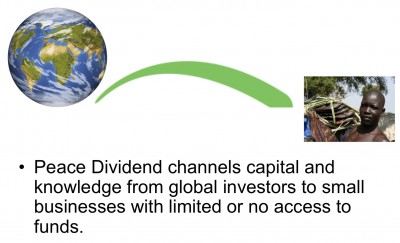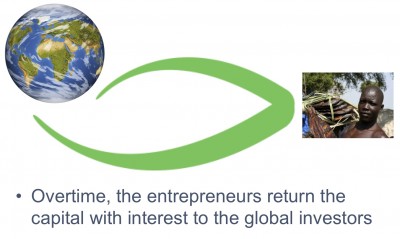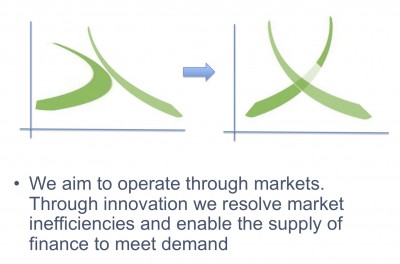Peace Dividend’s P2P Model For Financing Entrepreneurs in Post-Conflict Sudan
Editor’s Note: Melody Atil is the founder and managing director of Peace Dividend, which harnesses global diaspora networks to expand access to finance in countries recovering from civil war. The project is getting its start in Southern Sudan, where Peace Dividend plans to channel global capital to small businesses with limited or no access to finance. From 2007-2009 Atil was with the World Bank’s private sector development project for Southern Sudan from Juba and has a background in microfinance business development in Mexico and previously worked in finance at GE Capital London.
NextBillion.net: How’d you get involved with your work in South Sudan and what prompted you to build Peace Dividend?
Melody Atil: In my work for the World Bank in Southern Sudan, I saw that while micro-entrepreneurs and large companies with international backing or government connections could access loans, small local firms could not in Southern Sudan’s informal post-conflict environment. In effect, no lender with a western lending model would wish to lend given the lack of structures to secure formal land collateral and the nascent legal frameworks and enforcement systems. Building upon microfinance’s innovative approaches to informal loan markets, we developed novel approaches to reducing risk, differentiating between risky and safe borrowers and enforcing loan repayments that are better adapted to the informal environment of post-conflict Southern Sudan. The beauty of our model is that it directly connects borrowers to lenders. Thus, compared to donor-funded programs, we are much more flexible and fast moving, and have the potential to operate at much larger scale and scope.
NextBillion.net: How does Peace Dividend work?
Melody Atil: Peace Dividend is in some respects similar to microfinancing schemes, but also different because our loans are much larger and focused on employment, transfer of technology, knowledge dissemination and growth. Operating through an online peer-to-peer (P2P) platform, Peace Dividend is an improvement over KIVA schemes in that instead of routing funds through intermediaries (e.g. microfinance organizations), we channel the capital straight to the entrepreneur, thus reducing overhead costs (transaction costs) and interest charges. Peace Dividend also provides management advisory services, in addition to finance, helping entrepreneurs identify gaps in the market, connect with clients and access the same high-profit margins as the large international firms that currently operate in southern Sudan.
(Slides courtesy of Peace Dividend):
1.

2.

3.

NextBillion.net: Is Peace Dividend dependent on grants? If so, are there plans to become financially independent?
Melody Atil: The objective of the whole exercise is to be financially sustainable. If the lending through our platform increases to approximately $200,000 USD per month, we should achieve this objective, assuming relatively low default rates among our borrowers.
NextBillion.net: Do you and your team plan to expand beyond South Sudan?
Melody Atil: Our model would be well suited to other post-conflict economies (e.g., Haiti or Sri Lanka) as well as countries with large remittance flows and engaged diasporas (e.g. The Philippines).
NextBillion.net: How do you identify entrepreneurs to fund? What criteria do you look for?
Melody Atil: In order for a borrower’s proposal to be uploaded to our website in quest of funding, it must satisfy the following criteria:
- Impact – our objective is to enhance wealth sharing and to promote the development of the local industry. We thus focus on businesses that increase employment opportunities, have significant backward linkages to other Southern Sudanese suppliers/communities and promote the local industry. (We also evaluate the business with respect to good corporate social responsibility practices and conflict mitigation). We do not seek to make individuals with easy access to government coffers richer, but instead seek to empower talented individuals without such connections, access or knowledge – hence promoting the development of more evenly balanced social strata and a more stable and vibrant economy.
- Proven skill set/ability to manage a business – borrowers must demonstrate they can operate successfully in the chosen business stream and generate a profit.
- Sound business plan demonstrating entrepreneur’s ability to repay the loan – frequently, we restructure, or even help the entrepreneur develop a business plan.
- Ability for Peace Dividend to enforce repayment (through innovative collateral structuring) – we reduce the business risk to the absolute minimum though a mix of innovative instruments.
- Diaspora/expert/investor engagement and approval – we gather feedback on the proposals from industry experts, the Diaspora and other investors. If they place negative comments, we cross verify the facts. If the Diaspora do not invest – we do not fund the business. This is based on the rich Diaspora community networks, which help us mitigate adverse selection and moral hazard.
NextBillion.net: How do you measure success; what kind of metrics do you use to organize productivity?
Melody Atil: Through the following outcomes:
- Increased employment of Southern Sudanese (Numbers employed in program business.)
- Increased backward linkages to Southern Sudanese entrepreneurs (Total program business purchases from SS suppliers.)
- Increased local production/ service provision (Total sales revenue of program business.)
- Increased income for local Southern Sudanese Businesses (Total income of program business.)
- Increased business capacity of local entrepreneurs (industry specific measurable by quality of and scale of production) and business skills such as finance, marketing, sales, business planning (qualitative evaluation).
NextBillion.net: How does the investing structure work? Are investors given interest back with their loan? How does your process differ from KIVA?
Melody Atil: The main difference is direct lending to fund entrepreneur proposals through Peace Dividend’s systems. We reduce business and exchange risk to the bare minimum, thus the investor primarily takes on the country risk (political, macroeconomic, etc.). Returns are both social (extremely high returns – matching the high country risk of Southern Sudan) and financial (4%). USA investors are not offered a rate of return (but do get cash back) due to US Securities and Exchange Commission regulations. On the upside, donations to Peace Dividend will be tax deductable in the USA as Peace Dividend will have 501c3 status.
|
KIVA |
Peace Dividend |
|
|
NextBillion.net: What has been the biggest surprise with working in this space?
Melody Atil: The sheer number of selfless individuals that contributed to make this venture a reality. This continues to be a very humbling experience and we are extremely grateful for their kind engagement.
NextBillion.net: Given that some of our readers at some point will start SME related ventures, what pieces of advice would you lend them?
Melody Atil: On the one hand, starting up is not a lot of fun. Its really painful and lengthy process actually. I would question whether starting up such a venture is truly the best option for them or whether there may be shorter and better cuts to what they wish to achieve. On the other hand, it can be tremendously gratifying to see one’s hard work and dedication start to bear fruits!
- Categories
- Education
- Tags
- academia
